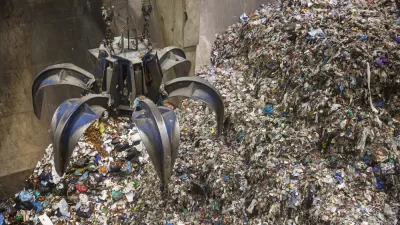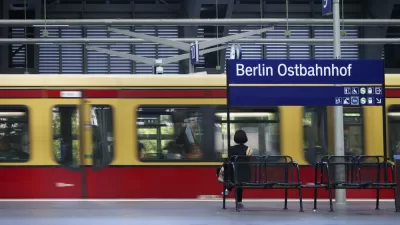With 87 total waste-to-energy plants in the U.S., the country is only able to convert 12 percent of its trash to electricity (compared to 38 percent for Germany, for instance). Why is America still sending 55 percent of its trash to landfills?
"So why hasn’t energy recovery become a staple of America’s renewable energy portfolio, as it has elsewhere?" asks Dylan Scott. "After all, it’s earned the endorsement of groups like the American Chemistry Council and the Center for American Progress (CAP). Researchers at the U.S. Environmental Protection Agency concluded that burning waste for energy, as the Alexandria plant does, is better for the environment and produces more power than burying it in a landfill and then attempting to extract energy later."
"Advocates blame the negative connotation much of the public has with trash incineration, the deep pockets of the landfill lobby, and the vocal coalition that argues America's goal should be eliminating waste altogether -- not turning it into a business."
FULL STORY: America's Wasting Trash-to-Energy Potential, Supporters Say

Planetizen Federal Action Tracker
A weekly monitor of how Trump’s orders and actions are impacting planners and planning in America.

Restaurant Patios Were a Pandemic Win — Why Were They so Hard to Keep?
Social distancing requirements and changes in travel patterns prompted cities to pilot new uses for street and sidewalk space. Then it got complicated.

Map: Where Senate Republicans Want to Sell Your Public Lands
For public land advocates, the Senate Republicans’ proposal to sell millions of acres of public land in the West is “the biggest fight of their careers.”

Maui's Vacation Rental Debate Turns Ugly
Verbal attacks, misinformation campaigns and fistfights plague a high-stakes debate to convert thousands of vacation rentals into long-term housing.

San Francisco Suspends Traffic Calming Amidst Record Deaths
Citing “a challenging fiscal landscape,” the city will cease the program on the heels of 42 traffic deaths, including 24 pedestrians.

California Homeless Arrests, Citations Spike After Ruling
An investigation reveals that anti-homeless actions increased up to 500% after Grants Pass v. Johnson — even in cities claiming no policy change.
Urban Design for Planners 1: Software Tools
This six-course series explores essential urban design concepts using open source software and equips planners with the tools they need to participate fully in the urban design process.
Planning for Universal Design
Learn the tools for implementing Universal Design in planning regulations.
Heyer Gruel & Associates PA
JM Goldson LLC
Custer County Colorado
City of Camden Redevelopment Agency
City of Astoria
Transportation Research & Education Center (TREC) at Portland State University
Camden Redevelopment Agency
City of Claremont
Municipality of Princeton (NJ)




























